Hays Travel's Response to Inflation: Strategies and Economic Impact
VerifiedAdded on 2023/06/05
|8
|2081
|354
Report
AI Summary
This report examines the impact of inflation on Hays Travel's business operations, identifying causes such as wages inflation, Covid-19 limitations, and global tensions. It analyzes the macroeconomic and microeconomic factors contributing to inflation and their effects on Hays Travel, including increased consumer price index, rising interest rates, and investment challenges. The report also discusses theories and strategies to mitigate the negative impacts of inflation and enhance positive effects, such as repositioning the company's brand, replacing the price model, and implementing fiscal policies. The conclusion emphasizes the need for travelers to be mindful of their spending power and highlights the tourism industry's vulnerability to inflation, while underscoring the importance of effective strategies to manage and reduce the adverse impacts of inflation on Hays Travel's operations.
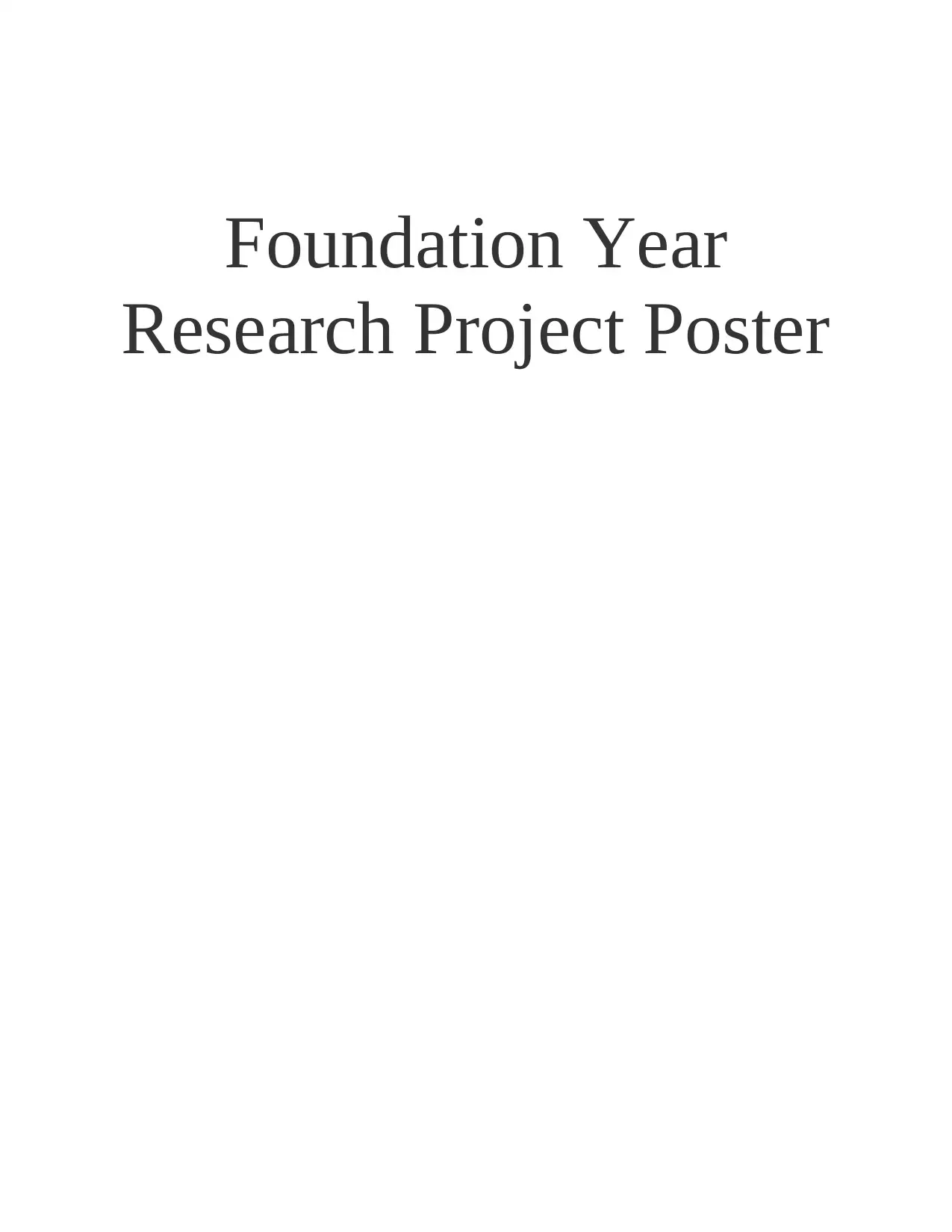
Foundation Year
Research Project Poster
Research Project Poster
Paraphrase This Document
Need a fresh take? Get an instant paraphrase of this document with our AI Paraphraser
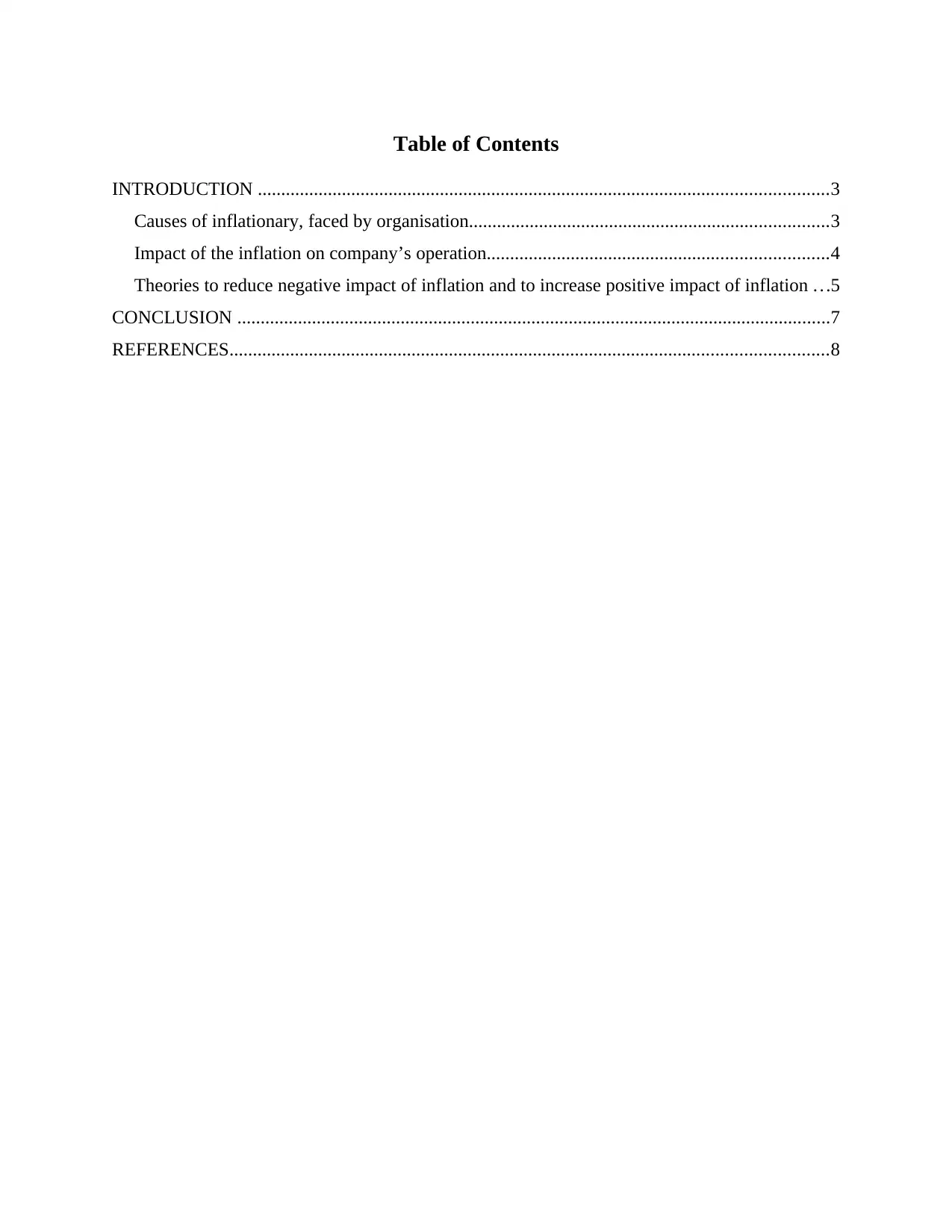
Table of Contents
INTRODUCTION ..........................................................................................................................3
Causes of inflationary, faced by organisation.............................................................................3
Impact of the inflation on company’s operation.........................................................................4
Theories to reduce negative impact of inflation and to increase positive impact of inflation ...5
CONCLUSION ...............................................................................................................................7
REFERENCES................................................................................................................................8
INTRODUCTION ..........................................................................................................................3
Causes of inflationary, faced by organisation.............................................................................3
Impact of the inflation on company’s operation.........................................................................4
Theories to reduce negative impact of inflation and to increase positive impact of inflation ...5
CONCLUSION ...............................................................................................................................7
REFERENCES................................................................................................................................8
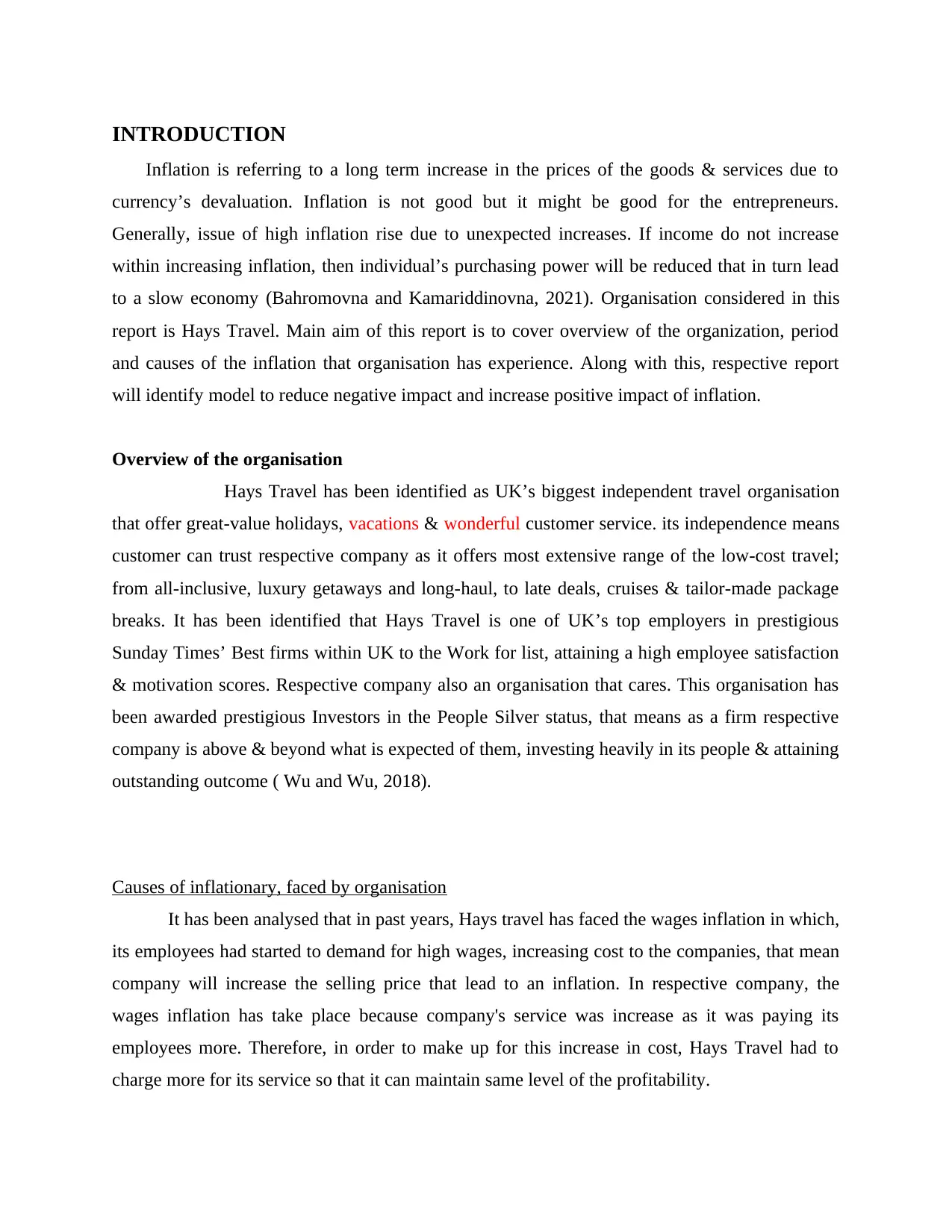
INTRODUCTION
Inflation is referring to a long term increase in the prices of the goods & services due to
currency’s devaluation. Inflation is not good but it might be good for the entrepreneurs.
Generally, issue of high inflation rise due to unexpected increases. If income do not increase
within increasing inflation, then individual’s purchasing power will be reduced that in turn lead
to a slow economy (Bahromovna and Kamariddinovna, 2021). Organisation considered in this
report is Hays Travel. Main aim of this report is to cover overview of the organization, period
and causes of the inflation that organisation has experience. Along with this, respective report
will identify model to reduce negative impact and increase positive impact of inflation.
Overview of the organisation
Hays Travel has been identified as UK’s biggest independent travel organisation
that offer great-value holidays, vacations & wonderful customer service. its independence means
customer can trust respective company as it offers most extensive range of the low-cost travel;
from all-inclusive, luxury getaways and long-haul, to late deals, cruises & tailor-made package
breaks. It has been identified that Hays Travel is one of UK’s top employers in prestigious
Sunday Times’ Best firms within UK to the Work for list, attaining a high employee satisfaction
& motivation scores. Respective company also an organisation that cares. This organisation has
been awarded prestigious Investors in the People Silver status, that means as a firm respective
company is above & beyond what is expected of them, investing heavily in its people & attaining
outstanding outcome ( Wu and Wu, 2018).
Causes of inflationary, faced by organisation
It has been analysed that in past years, Hays travel has faced the wages inflation in which,
its employees had started to demand for high wages, increasing cost to the companies, that mean
company will increase the selling price that lead to an inflation. In respective company, the
wages inflation has take place because company's service was increase as it was paying its
employees more. Therefore, in order to make up for this increase in cost, Hays Travel had to
charge more for its service so that it can maintain same level of the profitability.
Inflation is referring to a long term increase in the prices of the goods & services due to
currency’s devaluation. Inflation is not good but it might be good for the entrepreneurs.
Generally, issue of high inflation rise due to unexpected increases. If income do not increase
within increasing inflation, then individual’s purchasing power will be reduced that in turn lead
to a slow economy (Bahromovna and Kamariddinovna, 2021). Organisation considered in this
report is Hays Travel. Main aim of this report is to cover overview of the organization, period
and causes of the inflation that organisation has experience. Along with this, respective report
will identify model to reduce negative impact and increase positive impact of inflation.
Overview of the organisation
Hays Travel has been identified as UK’s biggest independent travel organisation
that offer great-value holidays, vacations & wonderful customer service. its independence means
customer can trust respective company as it offers most extensive range of the low-cost travel;
from all-inclusive, luxury getaways and long-haul, to late deals, cruises & tailor-made package
breaks. It has been identified that Hays Travel is one of UK’s top employers in prestigious
Sunday Times’ Best firms within UK to the Work for list, attaining a high employee satisfaction
& motivation scores. Respective company also an organisation that cares. This organisation has
been awarded prestigious Investors in the People Silver status, that means as a firm respective
company is above & beyond what is expected of them, investing heavily in its people & attaining
outstanding outcome ( Wu and Wu, 2018).
Causes of inflationary, faced by organisation
It has been analysed that in past years, Hays travel has faced the wages inflation in which,
its employees had started to demand for high wages, increasing cost to the companies, that mean
company will increase the selling price that lead to an inflation. In respective company, the
wages inflation has take place because company's service was increase as it was paying its
employees more. Therefore, in order to make up for this increase in cost, Hays Travel had to
charge more for its service so that it can maintain same level of the profitability.
⊘ This is a preview!⊘
Do you want full access?
Subscribe today to unlock all pages.

Trusted by 1+ million students worldwide
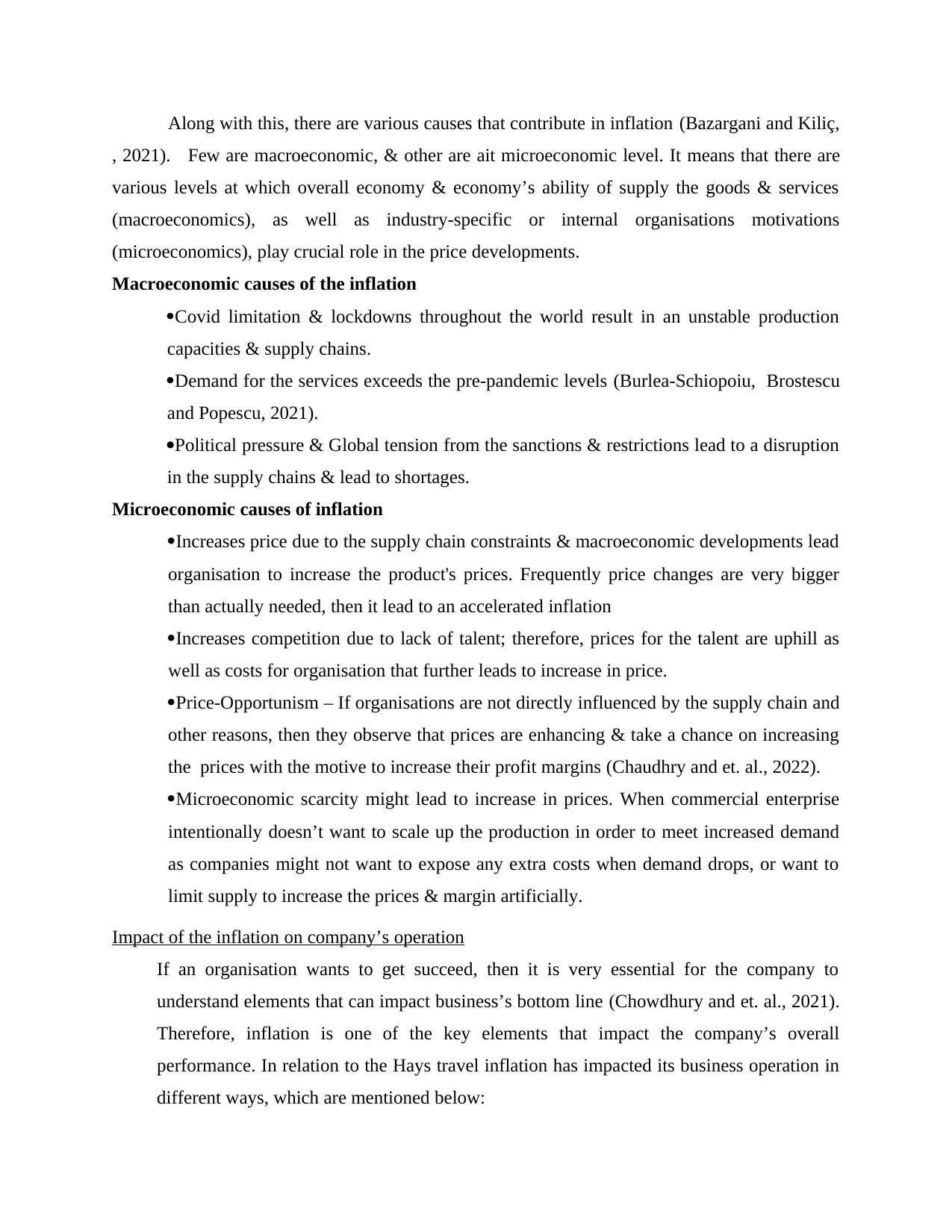
Along with this, there are various causes that contribute in inflation (Bazargani and Kiliç,
, 2021). Few are macroeconomic, & other are ait microeconomic level. It means that there are
various levels at which overall economy & economy’s ability of supply the goods & services
(macroeconomics), as well as industry-specific or internal organisations motivations
(microeconomics), play crucial role in the price developments.
Macroeconomic causes of the inflation
Covid limitation & lockdowns throughout the world result in an unstable production
capacities & supply chains.
Demand for the services exceeds the pre-pandemic levels (Burlea‐Schiopoiu, Brostescu
and Popescu, 2021).
Political pressure & Global tension from the sanctions & restrictions lead to a disruption
in the supply chains & lead to shortages.
Microeconomic causes of inflation
Increases price due to the supply chain constraints & macroeconomic developments lead
organisation to increase the product's prices. Frequently price changes are very bigger
than actually needed, then it lead to an accelerated inflation
Increases competition due to lack of talent; therefore, prices for the talent are uphill as
well as costs for organisation that further leads to increase in price.
Price-Opportunism – If organisations are not directly influenced by the supply chain and
other reasons, then they observe that prices are enhancing & take a chance on increasing
the prices with the motive to increase their profit margins (Chaudhry and et. al., 2022).
Microeconomic scarcity might lead to increase in prices. When commercial enterprise
intentionally doesn’t want to scale up the production in order to meet increased demand
as companies might not want to expose any extra costs when demand drops, or want to
limit supply to increase the prices & margin artificially.
Impact of the inflation on company’s operation
If an organisation wants to get succeed, then it is very essential for the company to
understand elements that can impact business’s bottom line (Chowdhury and et. al., 2021).
Therefore, inflation is one of the key elements that impact the company’s overall
performance. In relation to the Hays travel inflation has impacted its business operation in
different ways, which are mentioned below:
, 2021). Few are macroeconomic, & other are ait microeconomic level. It means that there are
various levels at which overall economy & economy’s ability of supply the goods & services
(macroeconomics), as well as industry-specific or internal organisations motivations
(microeconomics), play crucial role in the price developments.
Macroeconomic causes of the inflation
Covid limitation & lockdowns throughout the world result in an unstable production
capacities & supply chains.
Demand for the services exceeds the pre-pandemic levels (Burlea‐Schiopoiu, Brostescu
and Popescu, 2021).
Political pressure & Global tension from the sanctions & restrictions lead to a disruption
in the supply chains & lead to shortages.
Microeconomic causes of inflation
Increases price due to the supply chain constraints & macroeconomic developments lead
organisation to increase the product's prices. Frequently price changes are very bigger
than actually needed, then it lead to an accelerated inflation
Increases competition due to lack of talent; therefore, prices for the talent are uphill as
well as costs for organisation that further leads to increase in price.
Price-Opportunism – If organisations are not directly influenced by the supply chain and
other reasons, then they observe that prices are enhancing & take a chance on increasing
the prices with the motive to increase their profit margins (Chaudhry and et. al., 2022).
Microeconomic scarcity might lead to increase in prices. When commercial enterprise
intentionally doesn’t want to scale up the production in order to meet increased demand
as companies might not want to expose any extra costs when demand drops, or want to
limit supply to increase the prices & margin artificially.
Impact of the inflation on company’s operation
If an organisation wants to get succeed, then it is very essential for the company to
understand elements that can impact business’s bottom line (Chowdhury and et. al., 2021).
Therefore, inflation is one of the key elements that impact the company’s overall
performance. In relation to the Hays travel inflation has impacted its business operation in
different ways, which are mentioned below:
Paraphrase This Document
Need a fresh take? Get an instant paraphrase of this document with our AI Paraphraser
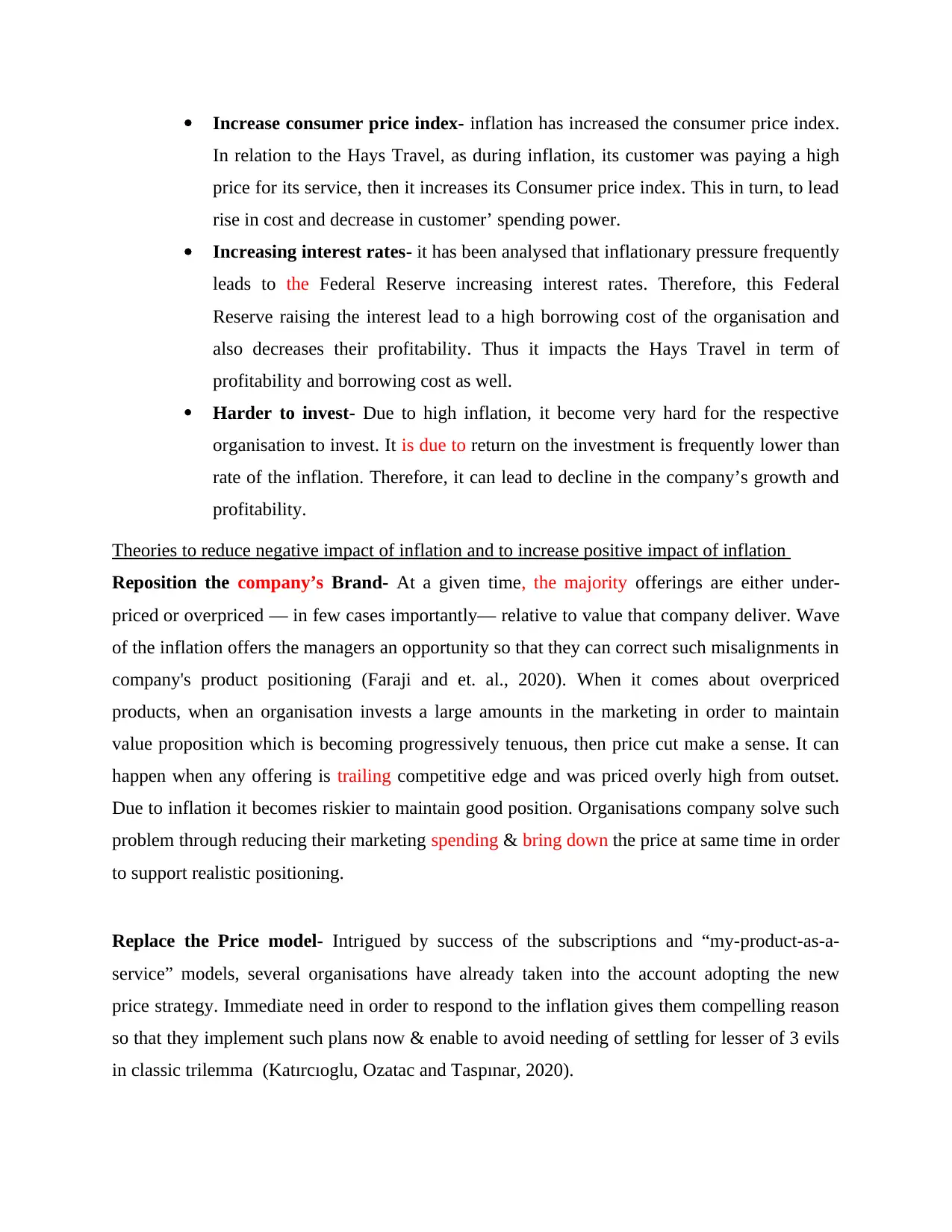
Increase consumer price index- inflation has increased the consumer price index.
In relation to the Hays Travel, as during inflation, its customer was paying a high
price for its service, then it increases its Consumer price index. This in turn, to lead
rise in cost and decrease in customer’ spending power.
Increasing interest rates- it has been analysed that inflationary pressure frequently
leads to the Federal Reserve increasing interest rates. Therefore, this Federal
Reserve raising the interest lead to a high borrowing cost of the organisation and
also decreases their profitability. Thus it impacts the Hays Travel in term of
profitability and borrowing cost as well.
Harder to invest- Due to high inflation, it become very hard for the respective
organisation to invest. It is due to return on the investment is frequently lower than
rate of the inflation. Therefore, it can lead to decline in the company’s growth and
profitability.
Theories to reduce negative impact of inflation and to increase positive impact of inflation
Reposition the company’s Brand- At a given time, the majority offerings are either under-
priced or overpriced — in few cases importantly— relative to value that company deliver. Wave
of the inflation offers the managers an opportunity so that they can correct such misalignments in
company's product positioning (Faraji and et. al., 2020). When it comes about overpriced
products, when an organisation invests a large amounts in the marketing in order to maintain
value proposition which is becoming progressively tenuous, then price cut make a sense. It can
happen when any offering is trailing competitive edge and was priced overly high from outset.
Due to inflation it becomes riskier to maintain good position. Organisations company solve such
problem through reducing their marketing spending & bring down the price at same time in order
to support realistic positioning.
Replace the Price model- Intrigued by success of the subscriptions and “my-product-as-a-
service” models, several organisations have already taken into the account adopting the new
price strategy. Immediate need in order to respond to the inflation gives them compelling reason
so that they implement such plans now & enable to avoid needing of settling for lesser of 3 evils
in classic trilemma (Katırcıoglu, Ozatac and Taspınar, 2020).
In relation to the Hays Travel, as during inflation, its customer was paying a high
price for its service, then it increases its Consumer price index. This in turn, to lead
rise in cost and decrease in customer’ spending power.
Increasing interest rates- it has been analysed that inflationary pressure frequently
leads to the Federal Reserve increasing interest rates. Therefore, this Federal
Reserve raising the interest lead to a high borrowing cost of the organisation and
also decreases their profitability. Thus it impacts the Hays Travel in term of
profitability and borrowing cost as well.
Harder to invest- Due to high inflation, it become very hard for the respective
organisation to invest. It is due to return on the investment is frequently lower than
rate of the inflation. Therefore, it can lead to decline in the company’s growth and
profitability.
Theories to reduce negative impact of inflation and to increase positive impact of inflation
Reposition the company’s Brand- At a given time, the majority offerings are either under-
priced or overpriced — in few cases importantly— relative to value that company deliver. Wave
of the inflation offers the managers an opportunity so that they can correct such misalignments in
company's product positioning (Faraji and et. al., 2020). When it comes about overpriced
products, when an organisation invests a large amounts in the marketing in order to maintain
value proposition which is becoming progressively tenuous, then price cut make a sense. It can
happen when any offering is trailing competitive edge and was priced overly high from outset.
Due to inflation it becomes riskier to maintain good position. Organisations company solve such
problem through reducing their marketing spending & bring down the price at same time in order
to support realistic positioning.
Replace the Price model- Intrigued by success of the subscriptions and “my-product-as-a-
service” models, several organisations have already taken into the account adopting the new
price strategy. Immediate need in order to respond to the inflation gives them compelling reason
so that they implement such plans now & enable to avoid needing of settling for lesser of 3 evils
in classic trilemma (Katırcıoglu, Ozatac and Taspınar, 2020).
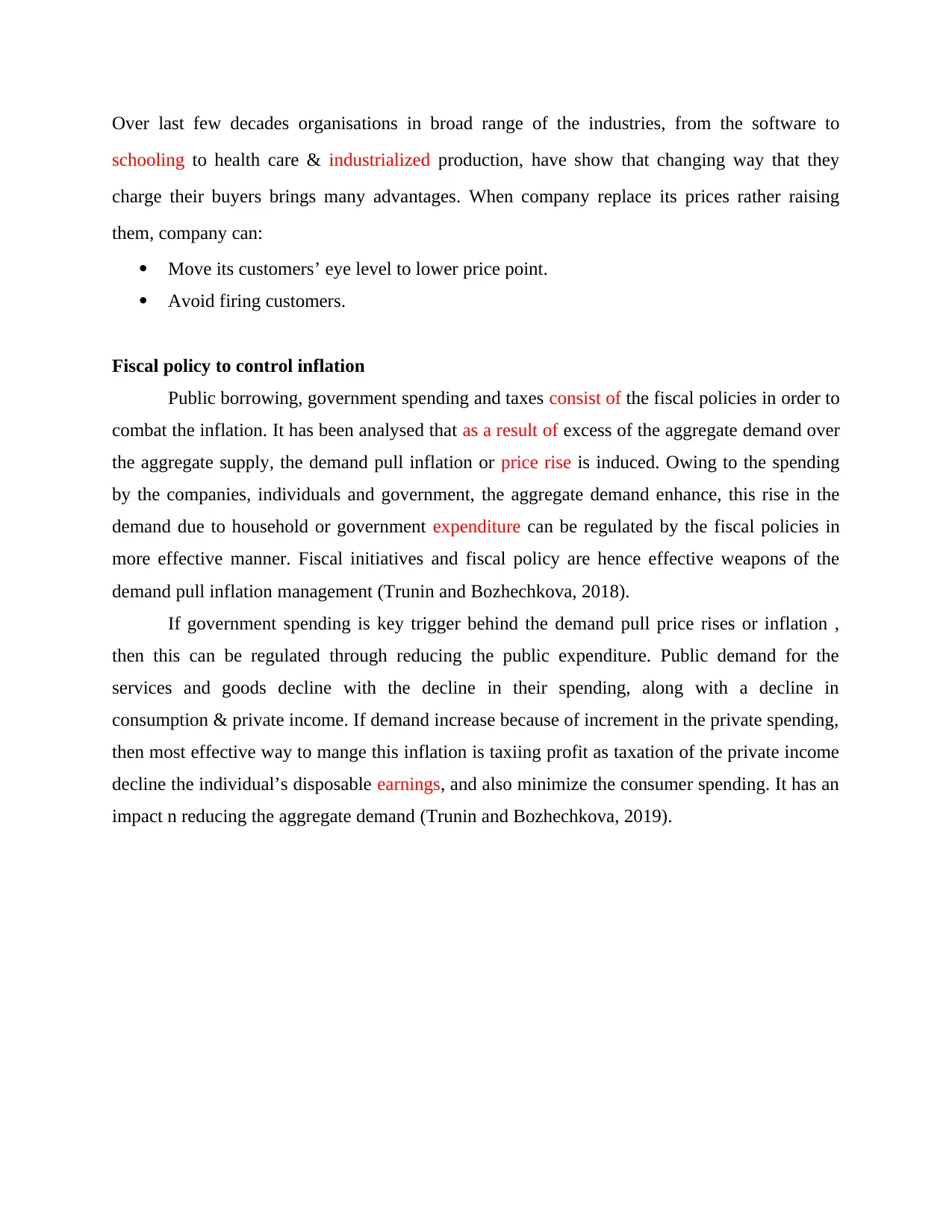
Over last few decades organisations in broad range of the industries, from the software to
schooling to health care & industrialized production, have show that changing way that they
charge their buyers brings many advantages. When company replace its prices rather raising
them, company can:
Move its customers’ eye level to lower price point.
Avoid firing customers.
Fiscal policy to control inflation
Public borrowing, government spending and taxes consist of the fiscal policies in order to
combat the inflation. It has been analysed that as a result of excess of the aggregate demand over
the aggregate supply, the demand pull inflation or price rise is induced. Owing to the spending
by the companies, individuals and government, the aggregate demand enhance, this rise in the
demand due to household or government expenditure can be regulated by the fiscal policies in
more effective manner. Fiscal initiatives and fiscal policy are hence effective weapons of the
demand pull inflation management (Trunin and Bozhechkova, 2018).
If government spending is key trigger behind the demand pull price rises or inflation ,
then this can be regulated through reducing the public expenditure. Public demand for the
services and goods decline with the decline in their spending, along with a decline in
consumption & private income. If demand increase because of increment in the private spending,
then most effective way to mange this inflation is taxiing profit as taxation of the private income
decline the individual’s disposable earnings, and also minimize the consumer spending. It has an
impact n reducing the aggregate demand (Trunin and Bozhechkova, 2019).
schooling to health care & industrialized production, have show that changing way that they
charge their buyers brings many advantages. When company replace its prices rather raising
them, company can:
Move its customers’ eye level to lower price point.
Avoid firing customers.
Fiscal policy to control inflation
Public borrowing, government spending and taxes consist of the fiscal policies in order to
combat the inflation. It has been analysed that as a result of excess of the aggregate demand over
the aggregate supply, the demand pull inflation or price rise is induced. Owing to the spending
by the companies, individuals and government, the aggregate demand enhance, this rise in the
demand due to household or government expenditure can be regulated by the fiscal policies in
more effective manner. Fiscal initiatives and fiscal policy are hence effective weapons of the
demand pull inflation management (Trunin and Bozhechkova, 2018).
If government spending is key trigger behind the demand pull price rises or inflation ,
then this can be regulated through reducing the public expenditure. Public demand for the
services and goods decline with the decline in their spending, along with a decline in
consumption & private income. If demand increase because of increment in the private spending,
then most effective way to mange this inflation is taxiing profit as taxation of the private income
decline the individual’s disposable earnings, and also minimize the consumer spending. It has an
impact n reducing the aggregate demand (Trunin and Bozhechkova, 2019).
⊘ This is a preview!⊘
Do you want full access?
Subscribe today to unlock all pages.

Trusted by 1+ million students worldwide
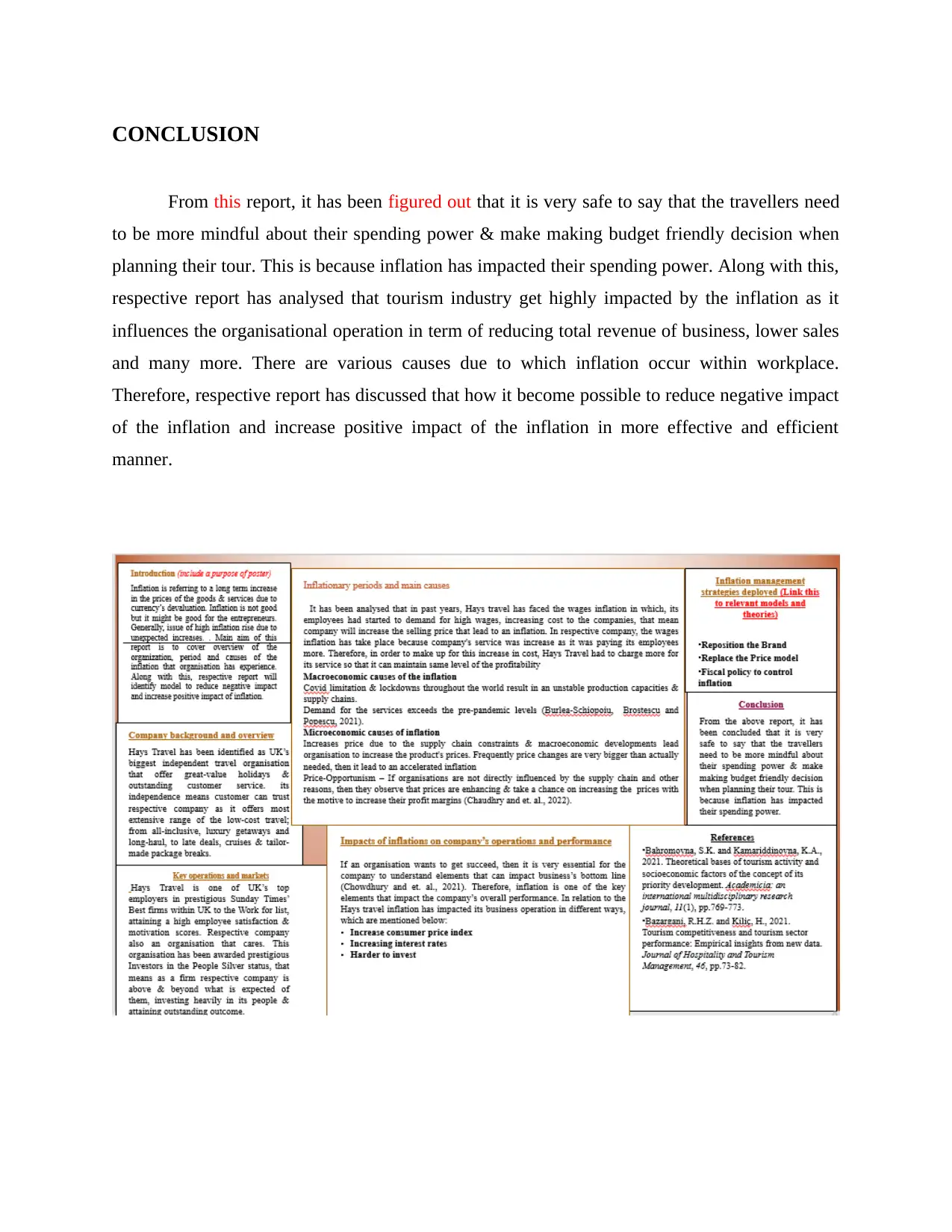
CONCLUSION
From this report, it has been figured out that it is very safe to say that the travellers need
to be more mindful about their spending power & make making budget friendly decision when
planning their tour. This is because inflation has impacted their spending power. Along with this,
respective report has analysed that tourism industry get highly impacted by the inflation as it
influences the organisational operation in term of reducing total revenue of business, lower sales
and many more. There are various causes due to which inflation occur within workplace.
Therefore, respective report has discussed that how it become possible to reduce negative impact
of the inflation and increase positive impact of the inflation in more effective and efficient
manner.
From this report, it has been figured out that it is very safe to say that the travellers need
to be more mindful about their spending power & make making budget friendly decision when
planning their tour. This is because inflation has impacted their spending power. Along with this,
respective report has analysed that tourism industry get highly impacted by the inflation as it
influences the organisational operation in term of reducing total revenue of business, lower sales
and many more. There are various causes due to which inflation occur within workplace.
Therefore, respective report has discussed that how it become possible to reduce negative impact
of the inflation and increase positive impact of the inflation in more effective and efficient
manner.
Paraphrase This Document
Need a fresh take? Get an instant paraphrase of this document with our AI Paraphraser
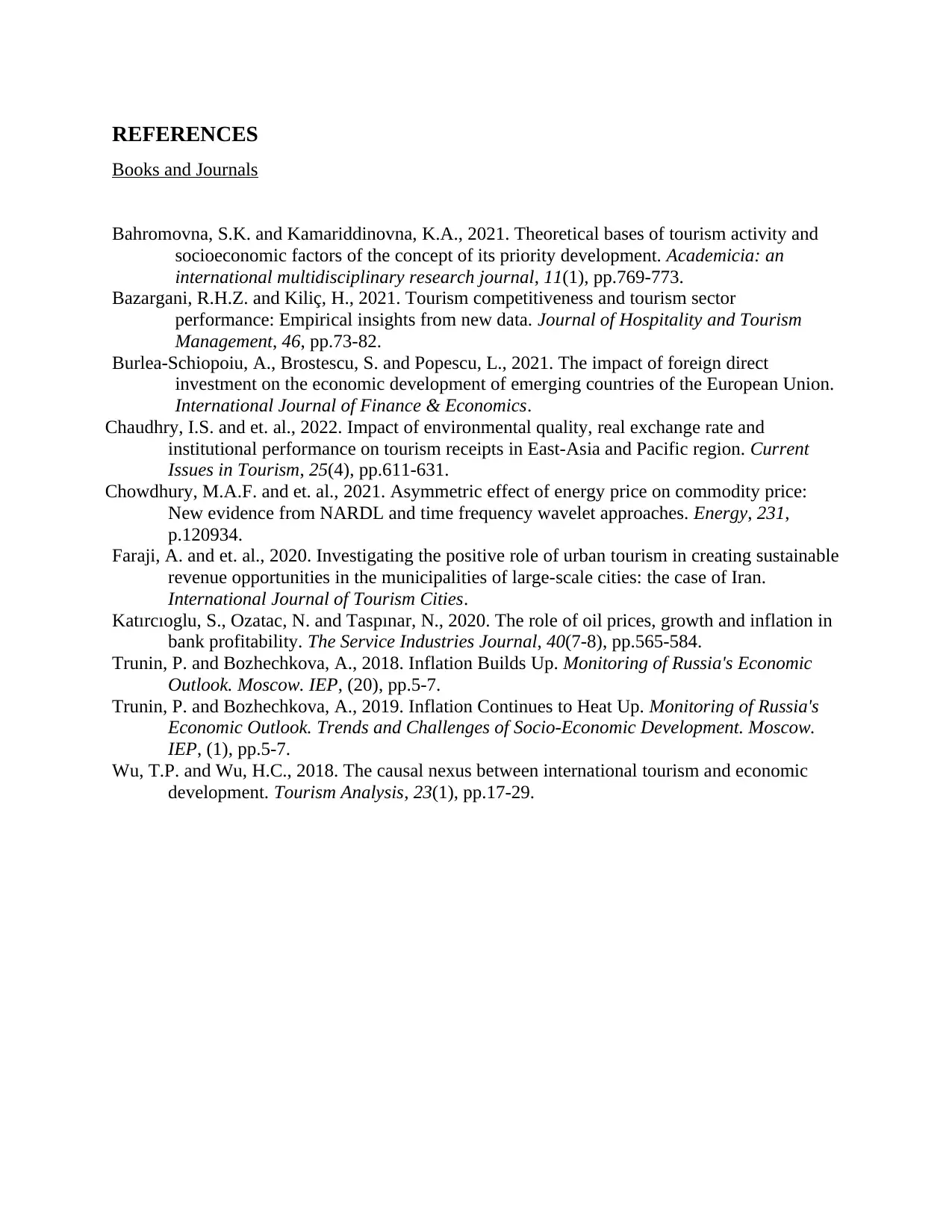
REFERENCES
Books and Journals
Bahromovna, S.K. and Kamariddinovna, K.A., 2021. Theoretical bases of tourism activity and
socioeconomic factors of the concept of its priority development. Academicia: an
international multidisciplinary research journal, 11(1), pp.769-773.
Bazargani, R.H.Z. and Kiliç, H., 2021. Tourism competitiveness and tourism sector
performance: Empirical insights from new data. Journal of Hospitality and Tourism
Management, 46, pp.73-82.
Burlea‐Schiopoiu, A., Brostescu, S. and Popescu, L., 2021. The impact of foreign direct
investment on the economic development of emerging countries of the European Union.
International Journal of Finance & Economics.
Chaudhry, I.S. and et. al., 2022. Impact of environmental quality, real exchange rate and
institutional performance on tourism receipts in East-Asia and Pacific region. Current
Issues in Tourism, 25(4), pp.611-631.
Chowdhury, M.A.F. and et. al., 2021. Asymmetric effect of energy price on commodity price:
New evidence from NARDL and time frequency wavelet approaches. Energy, 231,
p.120934.
Faraji, A. and et. al., 2020. Investigating the positive role of urban tourism in creating sustainable
revenue opportunities in the municipalities of large-scale cities: the case of Iran.
International Journal of Tourism Cities.
Katırcıoglu, S., Ozatac, N. and Taspınar, N., 2020. The role of oil prices, growth and inflation in
bank profitability. The Service Industries Journal, 40(7-8), pp.565-584.
Trunin, P. and Bozhechkova, A., 2018. Inflation Builds Up. Monitoring of Russia's Economic
Outlook. Moscow. IEP, (20), pp.5-7.
Trunin, P. and Bozhechkova, A., 2019. Inflation Continues to Heat Up. Monitoring of Russia's
Economic Outlook. Trends and Challenges of Socio-Economic Development. Moscow.
IEP, (1), pp.5-7.
Wu, T.P. and Wu, H.C., 2018. The causal nexus between international tourism and economic
development. Tourism Analysis, 23(1), pp.17-29.
Books and Journals
Bahromovna, S.K. and Kamariddinovna, K.A., 2021. Theoretical bases of tourism activity and
socioeconomic factors of the concept of its priority development. Academicia: an
international multidisciplinary research journal, 11(1), pp.769-773.
Bazargani, R.H.Z. and Kiliç, H., 2021. Tourism competitiveness and tourism sector
performance: Empirical insights from new data. Journal of Hospitality and Tourism
Management, 46, pp.73-82.
Burlea‐Schiopoiu, A., Brostescu, S. and Popescu, L., 2021. The impact of foreign direct
investment on the economic development of emerging countries of the European Union.
International Journal of Finance & Economics.
Chaudhry, I.S. and et. al., 2022. Impact of environmental quality, real exchange rate and
institutional performance on tourism receipts in East-Asia and Pacific region. Current
Issues in Tourism, 25(4), pp.611-631.
Chowdhury, M.A.F. and et. al., 2021. Asymmetric effect of energy price on commodity price:
New evidence from NARDL and time frequency wavelet approaches. Energy, 231,
p.120934.
Faraji, A. and et. al., 2020. Investigating the positive role of urban tourism in creating sustainable
revenue opportunities in the municipalities of large-scale cities: the case of Iran.
International Journal of Tourism Cities.
Katırcıoglu, S., Ozatac, N. and Taspınar, N., 2020. The role of oil prices, growth and inflation in
bank profitability. The Service Industries Journal, 40(7-8), pp.565-584.
Trunin, P. and Bozhechkova, A., 2018. Inflation Builds Up. Monitoring of Russia's Economic
Outlook. Moscow. IEP, (20), pp.5-7.
Trunin, P. and Bozhechkova, A., 2019. Inflation Continues to Heat Up. Monitoring of Russia's
Economic Outlook. Trends and Challenges of Socio-Economic Development. Moscow.
IEP, (1), pp.5-7.
Wu, T.P. and Wu, H.C., 2018. The causal nexus between international tourism and economic
development. Tourism Analysis, 23(1), pp.17-29.
1 out of 8
Related Documents
Your All-in-One AI-Powered Toolkit for Academic Success.
+13062052269
info@desklib.com
Available 24*7 on WhatsApp / Email
![[object Object]](/_next/static/media/star-bottom.7253800d.svg)
Unlock your academic potential
Copyright © 2020–2025 A2Z Services. All Rights Reserved. Developed and managed by ZUCOL.





